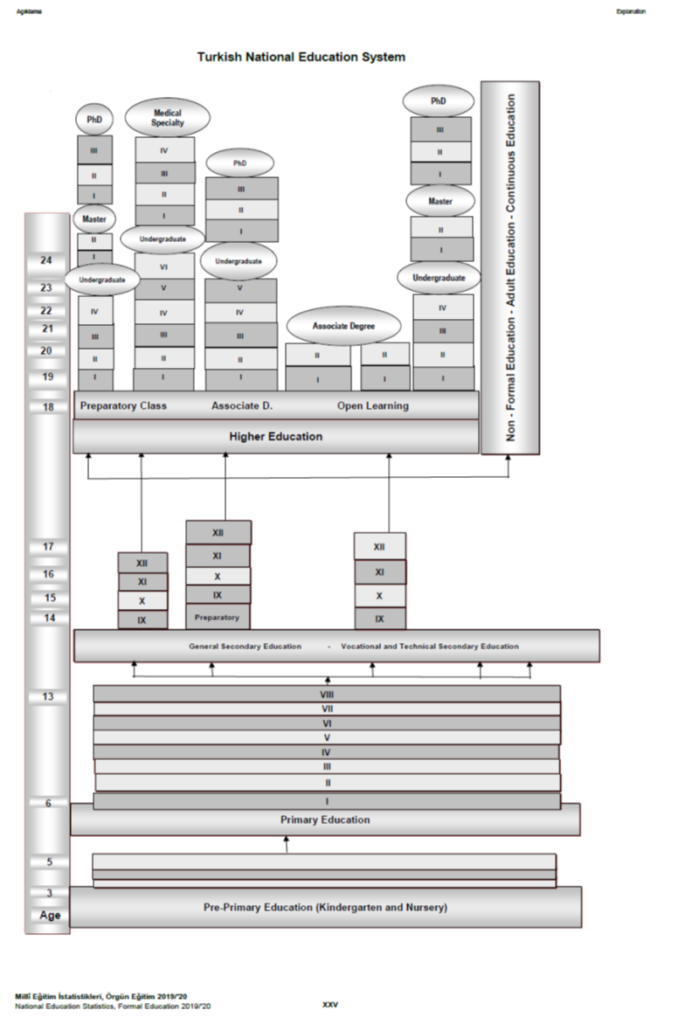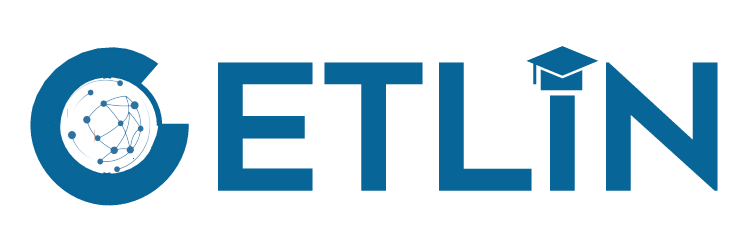Socio-political context & implications for teaching/educational policy
The Ministry of National Education [MoNE, in Turkish: Milli Eğitim Bakanlığı (MEB)] is responsible for the education system, and general directorates and their units are responsible for different aspects of education and policy compliance, such as basic education, secondary education, vocational education, special education and guidance and counselling (Figure 1).
Provincial and District National Education Directorates across 81 Turkish provinces support the implementation of education policy.
Other bodies that help to shape education policy in Turkey include:
- The National Council of Education, which convenes every four years, advises the MoNE.
- The Board of Education develops curriculum, plans and objectives, and approves textbooks.
- The Directorate for Strategy Development serves as the consultation unit and coordinates the work of establishing education strategies, policies and goals. The Directorate for Guidance and Inspection serves as the inspection unit. The Directorate General for Innovation and Education Technologies and the Directorate General for European Union and Foreign Relations coordinate involvement in international assessment studies.
- The Vocational Education Council decides on planning and development, with representatives from relevant ministries, trade and employers’ unions and other key social partners. The Vocational Qualifications Authority aligns VET professional qualifications with professional standards; and for each province there is a Board of Vocational Education.
- The Council of Higher Education (YÖK) and its committees are responsible for higher education policies, while the Higher Education Board supervises the institutions.
- The Assessment, Selection and Placement Centre is responsible for university entrance examinations and placement of teachers, in collaboration with the MoNE.
- The National Council for Teacher Training is an advisory body which coordinates between the YÖK and the MoNE.
Consultation with external stakeholders includes work with international organizations (such as the World Bank, the European Investment Bank, the United Nations, UNICEF and the European Union), the private sector, non-governmental organizations and teachers’ unions. (OECD, 2013)

Source: http://sgb.meb.gov.tr/meb_iys_dosyalar/2016_03/18024009_meb_istatistikleri_orgun_egitim_2015_2016.pdf
The National Education System, determined by National Education Basic Act No. 1739, consists of two main parts, namely “formal education” and “non-formal education”. Formal education is the regular education conducted within a school for individuals in a certain age group and at the same level, under programs developed in accordance with the purpose. Formal education includes pre-primary, primary school, lower secondary school, upper secondary and higher education institutions. In accordance with the general objectives and basic principles of national education, the objectives of non formal education, which covers citizens who have never entered the formal education system or are at any level of it or have left at that level, and which may accompany formal education or be independent of it are (Figure 2).
Mobile Classroom: Aiming at developing pre-primary education, mobile classroom is an implementation to institution based pre-primary education for children of low income families aged 36-66 months who cannot attend pre-primary education institutions. Mobile classroom project is carried out by General Directorate of Basic Education for provincial education directorates, municipalities and universities.
Education with Transport: It is the practice of transporting primary, lower secondary and upper secondary school students who have problems with access to the schools due to various reasons to certain schools on a daily basis with the aim of providing them with education.
Minority Schools are the private preschool, primary and upper secondary schools founded by Greek, Armenian and Jewish minorities and secured with the Treaty of Lausanne and to which students who are citizens of Republic of Turkey and who belong to those minorities attend. Some higher education programmes are given in English, German or French (MEB, 2016a).
The academic year consists of 2 semesters (in total 185 working days), and runs from the 2nd week of September until the 3th week of June. Winter break is two weeks at the end of January and the beginning of February. Summer holiday for teachers is from 1st July until 1st September. They work two weeks more at the beginning and the end of the terms. During these weeks, they participate in the professional development courses, evaluate the term or complete the preparations for the academic year.

Source: https://sgb.meb.gov.tr/meb_iys_dosyalar/2020_09/04144812_meb_istatistikleri_orgun_egitim_2019_2020.pdf
Current trends in educational policy and practice (e.g. relevant curricular reform cycles) & regional differences
Many recent reforms have been supported by national and international organisations, in certain cases beginning as pilot projects designed to transform national education policy.
Some of the most recent projects:
- E-School
Beginning from the educational year 2008-2009, data on students and buildings for pre-primary and primary education have been taken via internet from the e-schoolmodule. Beginning from the educational year 2009-2010, data on students and buildings for secondary education have been taken via internet from the e-schoolmodule (MEB, 2016a).
- Movement of Enhancing Opportunities and Improving Technology (FATIH)
FATIH Project in Education is launched in 2012 with the purpose of providing equal opportunities in education and improving the technology in schools in a way that informatics technology tools to engage more senses in the educational process (MEB, 2016b).
- Compulsory Education for 12 years [4+4+4])
Turkey has one of the highest percentages of 25-64 year-old adults who completed only primary education. (46 %, rank 1/36) or less than primary education. (5 %, rank 6/26) which is the lowest among OECD and partner countries with available data (64 %, rank 26/28 (OECD, 2015). To improve education quality and increase participation rates, in March 2012, the Grand National Assembly passed new legislation on primary and secondary education usually termed as “4+4+4” (4 years primary education, first level, 4 years primary education, second level and 4 years secondary education). Children begin their primary education in the first month of September following their sixth birthdays and come to a close during the school year in which students turn 14 years old. (MEB, 2012, 2016a).
- Novice Teacher Professional Development and Career Development (see section in-service education of teachers)
Turkey has one of youngest teaching workforces of all OECD countries. Some 61% of primary and 76% lower secondary teachers (OECD average 38%) are under 40 (OECD, 2015). A new performance based program was set up for the Novice Teacher professional appointment and Career development on February 2016. First group of novice teachers (30 thousand) completed the program between March – August 2016 and they start to work at schools on September 2016 (MEB, 2015a, 2016c).
In two waves, 30 thousand teachers applied to the position announcement of the Ministry of education in August and September 2016 (MEB, 2016d)
- Girls’ education
Women are well represented in the fields of sciences, technology, engineering and mathematics. Some 48% of tertiary graduates in science and 25% of graduates in engineering, manufacturing and construction were women (OECD averages of 39% and 24%, respectively) (OECD, 2015). But still the school rate of girls in primary and secondary schools was 87 percent in 2002, this figure rose to 95 percent in 2015 with efficient studies that were run with the Ministry of National Education (MONE) and support from civil society organizations (Ergu, 2016).
The girls’ education campaign in Turkey
- Hey Girls, Let’s Go to School!
(http://www.unicef.org/turkey/pr/ge6.html) (2001-2005)
- Dad, Send me to School” (BBOG) project
(http://www.bbog.org/) (2005 – current)
- Mother-Daughter to School Campaign
(http://www.eokul-meb.com/ana-kiz-okuldayiz-kampanyasi-34731/) (2008- 2012)
- VET education
Multiple reforms in VET have occurred over the past two decades to increase the skilled labour force in Turkey. Parliament released on October 2016 a vocational education law to support the number of students in secondary schools for vocational education with the enrol 50 percent the secondary students to VET. Currently, 44 % (1 million 732 students) of secondary school students are attending the vocational education at 3297 schools (MEB, 2016e).
- Syrian Refugees
Since the beginning of Syrian civil war in 2011, Turkey is hosting refugees mostly children. The number of refuges is over 2.5 million and 50 % is under the age of 19 and around one million are school children. With the first wave of refugees, Turkish Ministry of Education set up the temporary education centres. Around 260 thousand Syrian kids of school age have continued their education at 425 centres in 21 provinces in their mother language. Syrian teachers within the refugee group are appointed to these centres. Turkish Ministry of education and UNICEF started a teacher training program before the academic year in August-September 2016 to improve the education quality and support the professional development of 20 thousand Syrian teachers working at these centres.
Besides these, over 60 thousand Syrian kids are following mainstream education in Turkish schools. Ministry of Education are working on a basic education program that Syrian kids continue their education with Turkish kids at primary school level starting with September 2016. (MEB 2016f, 2016g). Currently, Turkey is home to the highest number of Syrian refugees (UNHCR, 17 May, 2021).

Source: http://www.unhcr.org/figures-at-a-glance.html
Current international examinations (PISA, TIMISS)
Turkey has been participating in PISA since 2003, and examination have been carried out on a computer basis since 2015. Turkey participated with 186 schools and 6890 students PISA 2018. The selection of the students in the sample was made randomly (based on probability) by the International Center to represent 15-year-old students in Turkey.
Turkey has made considerable improvements in educational performance over recent years. Going forward, maintaining and extending such improvements, while strengthening inclusiveness so that all students can access quality and engaging education regardless of the pathway they follow. Similarly, although student performance has improved, a smaller share of students in Turkey achieve baseline proficiency (PISA level 2) in reading, mathematics and science than on average across the OECD. In PISA 2018, Turkey had the highest rates of school-level isolation among both high and low achievers, as well as an above-average isolation index for advantaged students, suggesting some academic and social segregation within the Turkish system. Students in Turkey reported a low sense of belonging at school and high levels of truancy in PISA 2018.
